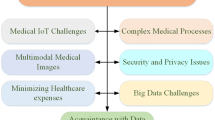Abstract
The COVID-19 pandemic caused havoc on the world, infecting more than 3.5 billion people and resulting in over 15 million deaths, and overwhelmed existing healthcare infrastructures around the world, as announced by the World Health Organization (WHO). We propose in this work an effective and low-cost strategy for collecting, pre-processing, and extracting meaningful information from different types of patient data that may be useful for statistics and training of Machine Learning (ML) models to respond to pandemics such as COVID-19. Information like medical history, clinical examination, para-clinical testing, and patient RGB videos are collected This achievement will enable further studies to train, test, and deploy on-device decentralized ML models to monitor patients at home.
Supported by the Military Research Center and the Military Hospital of Tunis.
Access this chapter
Tax calculation will be finalised at checkout
Purchases are for personal use only
Similar content being viewed by others
References
Zineb, J., Adam, B.: Chapter 9 - Remote patient monitoring using artificial intelligence, In: Adam, B., Kaveh, M. (eds.) Artificial Intelligence in Healthcare, Academic Press 2020, pp. 203–234. https://doi.org/10.1016/B978-0-12-818438-7.00009-5
Rohmetra, H., Raghunath, N., Narang, P. et al. AI-enabled remote monitoring of vital signs for COVID-19: methods, prospects and challenges. Computing (2021). https://doi.org/10.1007/s00607-021-00937-7
Zarei, J., Badavi, M., Karandish, M., et al.: A study to design minimum dataset of COVID-19 registry system., vol. 773, pp. 13. BMC Infect Dis (2021). https://doi.org/10.1186/s12879-021-06507-8
Pollard, T., Shen, L., et al. : MIMIC-III, a freely accessible critical care database., vol. 160035, pp. 9. Sci Data 3 (2016). https://doi.org/10.1038/sdata.2016.35
Guillaume, H., Andr\(\acute{~}\)e, A., Sebastien, M.: A Reproducible Study on Remote Heart Rate Measurement (2017) . https://doi.org/10.48550/arxiv.1709.00962
Agostina, J. Larrazabal., Victoria, P., Nicol\(\acute{~}\)as, N., Diego, H. Milone., Enzo, F.: Gender imbalance in medical imaging datasets produces biased classifiers for computer-aided diagnosis. vol. 117, pp. 23. PNAS (2020). https://doi.org/10.1073/pnas.1919012117
Rolfe, S.: The importance of respiratory rate monitoring. British J. Nursing 28, 504–508 (2019). https://doi.org/10.12968/bjon.2019.28.8.504
Author information
Authors and Affiliations
Corresponding author
Editor information
Editors and Affiliations
Rights and permissions
Copyright information
© 2022 The Author(s), under exclusive license to Springer Nature Switzerland AG
About this paper
Cite this paper
Khlil, F., Naouali, S., Raddadi, A., Ben Salem, S., Gharsallah, H., Romdhani, C. (2022). Multi-task Learning Dataset for the Development of Remote Patient Monitoring System. In: Nguyen, N.T., Manolopoulos, Y., Chbeir, R., Kozierkiewicz, A., Trawiński, B. (eds) Computational Collective Intelligence. ICCCI 2022. Lecture Notes in Computer Science(), vol 13501. Springer, Cham. https://doi.org/10.1007/978-3-031-16014-1_43
Download citation
DOI: https://doi.org/10.1007/978-3-031-16014-1_43
Published:
Publisher Name: Springer, Cham
Print ISBN: 978-3-031-16013-4
Online ISBN: 978-3-031-16014-1
eBook Packages: Computer ScienceComputer Science (R0)




